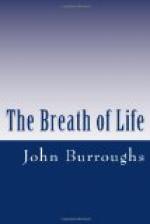VI
It should not surprise nor disturb us that the scientific interpretation of life leads to materialism, or to the conviction of the all-sufficiency of the mechanical and chemical forces of dead matter to account for all living phenomena. It need not surprise us because positive science, as such, can deal only with physical and chemical forces. If there is anything in this universe besides physical and chemical force, science does not know it. It does not know it because it is absolutely beyond the reach of its analysis. When we go beyond the sphere of the concrete, the experimental, the verifiable, only our philosophy can help us. The world within us, the world of psychic forces, is beyond the ken of science. It can analyze the living body, trace all its vital processes, resolve them into their mechanical and chemical equivalents, show us the parts played by the primary elements, the part played by the enzymes, or ferments, and the like, and yet it cannot tell us the secret of life—of that which makes organic chemistry so vastly different from inorganic. It discloses to us the wonders of the cell—a world of mystery by itself; it analyzes the animal body into organs, and the organs into tissues, and the tissues into cells, but the secret of organization utterly baffles it. After Professor Wilson had concluded his masterly work on the cell, he was forced to admit that the final mystery of the cell eluded him, and that his investigation “on the whole seemed to widen rather than to narrow the enormous gap that separates even the lowest forms of life from the inorganic world.”
All there is outside the sphere of physical science belongs to religion, to philosophy, to art, to literature. Huxley spoke strictly and honestly as a man of science, when he related consciousness to the body, as the sound of a clock when it strikes is related to the machinery of the clock. The scientific analysis of a living body reveals nothing but the action of the mechanical and chemical principles. If you analyze it by fire or by cremation, you get gases and vapors and mineral ash, that is all; the main thing about the live body—its organization, its life—you do not get. Of course science knows this; and to account for this missing something, it philosophizes, and relegates it to the interior world of molecular physics—it is all in the way the ultimate particles of matter were joined or compounded, were held together in the bonds of molecular matrimony. What factor or agent or intelligence is active or directive in this molecular marriage of the atoms, science does not inquire. Only philosophy can deal with that problem.




